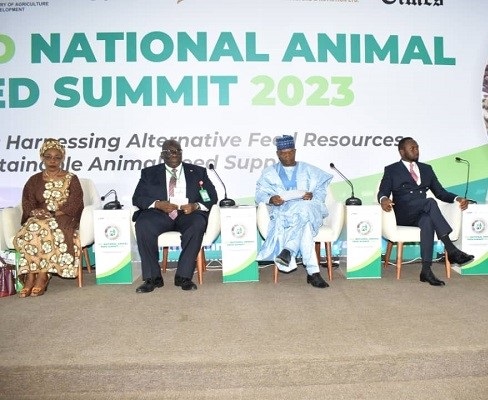
The Federal Government and its development partners have developed a roadmap for National Alternative Feed resources to address the challenges of high cost and price volatility in the animal feed industry.
The Minister of Agriculture and Rural Development, Dr. Mohammad Mahmood Abubakar revealed this at the 2nd National Animal Feed Summit in Abuja. The summit’s theme, “Harnessing Alternative Feed Resources for Sustainable Animal Feed Supply,” aligns with the Federal Government’s agenda to improve the Animal Feed Policy, Feed Value Chain, Feed Quality Control and Safety, National Strategic Feed Reserve, among other goals.
According to Abubakar, the role of animal feed in Nigeria’s agriculture sector is critical in providing essential nutrients and support for livestock and production. However, the animal feed market faces challenges such as a lack of access to credit and markets, low investment in research and development, and a mix of small and large-scale traditional and modern methods. To meet the increasing demand for animal feed in Nigeria, there is a need for innovation and technology to develop sustainable and efficient production methods that will support small-scale and rural communities.
The permanent secretary of the ministry, Dr. Ernest Umakhihe noted that the animal feed industry in Nigeria is far from meeting national sufficiency in production. Nigeria produces an average of 5.5 million tonnes per annum, comprising 85 per cent poultry feeds and has the potential to grow not less than 50 million metric tonnes per annum, if the commercial ruminant and swine feeding sub-sectors are harnessed. The Feed sector has the potential to engage over 20 million Nigerians, as the industry is yet to reach 25 per cent of its market size.
The challenges faced by the Animal Feed industry in Nigeria have necessitated the need for the National Animal Feed Summit. The managing partner of Sahel Consulting Agriculture and Nutrition, Temi Adegoroye emphasised the need for collaborative efforts among stakeholders to achieve food security in Nigeria. As the impact of climate change continues to affect agriculture activities, it is essential to explore sustainable practices in animal feed production to guarantee farmers access to affordable feed all year round.
The meeting was attended by representatives of Sahel Consulting Agriculture and Nutrition Ltd, Premium Times, Centre for Journalism Innovation and Development, All Farmers Association of Nigeria, the country representatives of FAO and ECOWAS, among others. The stakeholders deliberated on strategies to come up with a robust and implementable National Animal Feed policy.


